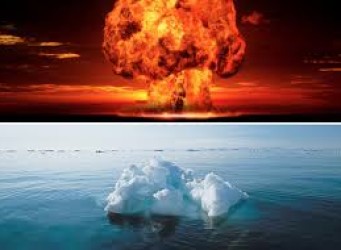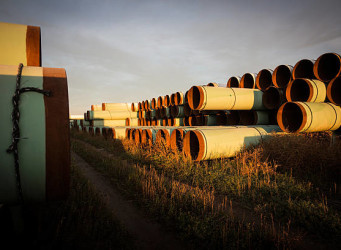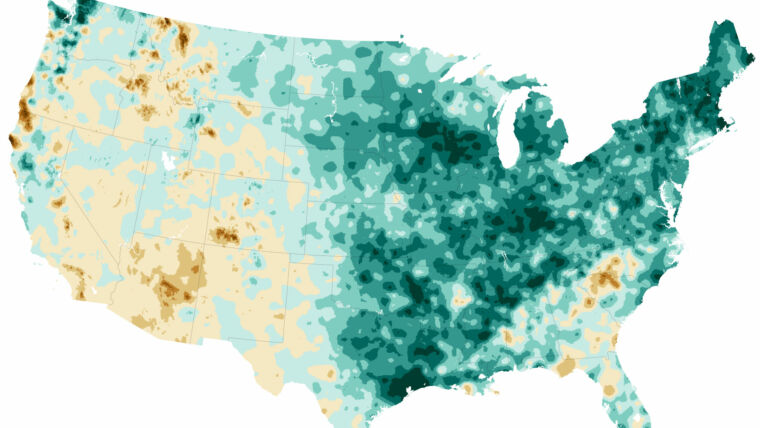Over the years I have written about how climate change is a threat to world peace. In fact, the Pentagon has been saying this in its security threat reports since the ’90′s. They actually call it the highest threat to peace. The reason is what climate change is doing to natural resources. For instance, what would you do if your main, or possibly only, source of clean water was eliminated. From the article, here’s an example:
“Lake Chad Basin to examine factors that led the lake to shrink 90 percent since the 1960s.”
Without water you have to move. We are seeing now what the impact is of mass migrations both in Europe and on our own southern border. Climate is not the only reason that causes the problems but it certainly contributes and actually could be the primary reason. We’re locked in now to a continually warming planet. The question is whether we will be able to slow down, reduce the possible worst outcomes and someday get us back to a more stable climate? Or will we be unable to avoid total climate chaos? It’s up to us. And the place to make the biggest difference is at the ballot box.
“We must understand climate change as one issue in a web of factors that can lead to conflict,” she said. “Within this web, climate change acts as a threat multiplier, applying additional stress on prevailing political, social and economic pressure points.”
“Fragile countries are in danger of becoming stuck in a cycle of conflict and climate disaster,”
“We must understand climate change as one issue in a web of factors that can lead to conflict,” she said. “Within this web, climate change acts as a threat multiplier, applying additional stress on prevailing political, social and economic pressure points.”
“security threats. These include food insecurity, competition for water resources, mass migrations and environmental damage inflicted by terrorist organizations like the Islamic State group.”
U.N. Council is Warned that Warming Creates ‘Cycle of Conflict
Daniel Cusick, E&E News reporter
“It is clear that climate change is a real threat and is proceeding at a relentless pace,” U.N. Deputy Secretary-General Amina Mohammed told the 15-member council Wednesday at the United Nations.
“Fragile countries are in danger of becoming stuck in a cycle of conflict and climate disaster,” she added. “Where resilience is eroded, communities may be displaced and exposed to exploitation.”
Mohammed’s comments came against the backdrop of three consecutive years — 2015, 2016 and 2017 — that the World Meteorological Organization determined were the hottest on record. Experts say extreme heat, drought and other consequences of warming are having a disproportionate effect on the world’s poor.
“It is no coincidence that the countries most vulnerable to climate change are often those most vulnerable to conflict and fragility,” Mohammed said.
Citing her own experience growing up in the Lake Chad Basin in northeast Nigeria, Mohammed said she had witnessed how climate change places stress on existing political, social and economic rifts.
“We must understand climate change as one issue in a web of factors that can lead to conflict,” she said. “Within this web, climate change acts as a threat multiplier, applying additional stress on prevailing political, social and economic pressure points.”
The Security Council, one of six major organs of the United Nations, last took up the issue of climate change seven years ago.
The meeting was led by Swedish Foreign Minister Margot Wallström, who recently accompanied Mohammed to the Lake Chad Basin to examine factors that led the lake to shrink 90 percent since the 1960s.
Wallström challenged the Security Council to “catch up with the changing reality on the ground.” She announced the forthcoming launch of a climate security knowledge hub in Stockholm and suggested that Mohammed provide an “institutional home” for the issue of climate change and conflict at the United Nations.
Other ideas proposed by forum delegates included the appointment of a special representative of the secretary-general on climate and security.
Hindou Ibrahim, speaking on behalf of the International Indigenous Peoples Forum on Climate Change, urged the council to view climate change and its effects at the village and community level, where stressors can be most acutely felt. “They do not have a choice, but you do,” she said.
Hassan al-Janabi, Iraq’s minister for water resources, noted that debate opened a new path for finding potential solutions to security threats. These include food insecurity, competition for water resources, mass migrations and environmental damage inflicted by terrorist organizations like the Islamic State group.
Jonathan Cohen, the United States’ deputy representative to the Security Council, said the body considers phenomena such as natural disasters — as well as other events that impact populations and cause widespread displacement — in its work.
“In response to these crises, we are all on the same side,” he said.
Russia representative Dmitry Polyanskiy cast doubt on the Security Council’s ability to effectively address climate change, calling the effort a “misguidance” of the group’s responsibility to maintain peace and security.
“We are creating an illusion that the council will tackle climate issues and that there will be some kind of turning point,” he said, adding that the Security Council doesn’t have the expertise or the mechanisms to effectively counter climate change’s effects.



